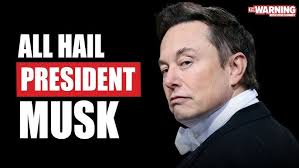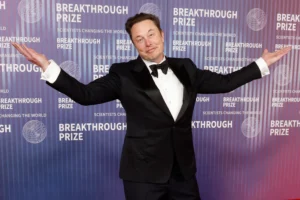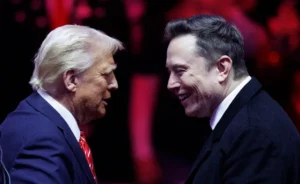In a moment that has sparked both awe and alarm, Elon Musk once again reminded the world that his power is not just technological or financial—it’s political, symbolic, and increasingly global. In a now-viral video, political strategist Steve Schmidt lays out a damning case: Elon Musk’s influence has surpassed that of most elected officials, and his latest moves prove he knows it.

What began as a seemingly flamboyant publicity stunt—a chainsaw-waving speech at CPAC—quickly evolved into a symbolic flex of raw political muscle. But behind the theatrics lies a serious reality: Musk is no longer just a billionaire entrepreneur. He is becoming a transnational power player, and his reach into government policy, public discourse, and even international politics is growing by the day.
The Chainsaw at CPAC: A Warning in Disguise
At the 2025 Conservative Political Action Conference, Musk appeared on stage with Argentine President Javier Milei and hoisted a chainsaw into the air. The crowd roared. Musk declared it a symbol of his new mission to slash bureaucratic waste through his Department of Government Efficiency—DOGE, a real initiative that began as satire and has since evolved into a semi-official entity influencing federal contract decisions and regulatory priorities.
What many dismissed as a meme-worthy moment turned out to be a clear signal. Musk is not just positioning himself as a political commentator. He is angling to become a kingmaker, or perhaps even more—someone who sets the agenda, not just reacts to it.
After facing criticism, Musk said the chainsaw moment “lacked empathy.” But the damage—or the impact—was already done. His supporters hailed it as a declaration of war against the “deep state.” His critics called it dystopian theater. Either way, Musk controlled the narrative.
DOGE: From Internet Joke to Political Weapon

DOGE began as a tongue-in-cheek acronym referencing the popular meme cryptocurrency, but Elon Musk turned it into something much more serious: a think tank-slash-task force aimed at “streamlining” federal spending and regulatory processes.
Under the guise of efficiency, Musk’s DOGE has reportedly influenced procurement policy, tech contracts, and even tax code provisions related to electric vehicles and artificial intelligence. His public criticism of Trump’s “Big, Beautiful Bill” over EV tax cuts wasn’t just a billionaire complaining—it was a targeted political maneuver to protect his empire and flex his institutional influence.
Trump’s response? Fury.
The former president threatened to revoke federal contracts, publicly hinted at using DOGE against Musk, and even floated the idea of reviewing Musk’s citizenship and immigration status—a move so extreme it triggered bipartisan backlash.
The Musk-Trump Feud: Power vs. Power

The Musk-Trump relationship, once flirtatious and mutually beneficial, has now turned into an open conflict.
Musk accused Trump of economic sabotage and likened the former president’s spending spree to “a child with a loaded bazooka.” Trump fired back with threats, calling Musk “a tech tyrant” and suggesting he could “unleash the monster DOGE to eat him alive.”
These aren’t idle words. Trump still holds immense sway over the Republican Party, while Musk controls the communication infrastructure (X, formerly Twitter), satellite networks (Starlink), AI labs (xAI), and one of the world’s most influential car companies (Tesla). When these two collide, it’s not just a celebrity feud—it’s a potential reshaping of American power structures.
Global Influence: Musk’s Reach Beyond Borders
Musk’s power isn’t confined to the United States. He’s made high-profile appearances in Europe, Asia, and South America, often aligning with nationalist or right-leaning leaders like Milei. In Germany, his cozy ties with far-right AfD members have drawn sharp criticism from the EU. In Canada, his rhetoric is being adopted by Conservative Party factions hostile to climate regulation and tech oversight.
He’s not simply exporting Teslas—he’s exporting ideology.
And with SpaceX satellites now providing internet access in conflict zones and developing nations, his geopolitical leverage is literally orbiting above every nation on Earth.
What Steve Schmidt Warns
In the video, Steve Schmidt issues a stark warning: Elon Musk may now be more powerful than most cabinet members in the U.S. government. His access to markets, media, AI, energy, aerospace, and public attention is so vast that traditional checks and balances are ineffective against him.
He doesn’t need to run for office. He’s already doing what many politicians only dream of—shaping policy, punishing enemies, and defining narratives.
Worse yet, he’s not constrained by party loyalty, ethical review boards, or re-election. His decisions are dictated by his own convictions—or whims.
The Risks of Unchecked Power
Schmidt’s central argument is that Elon Musk represents a dangerous new archetype: the unregulated billionaire-statesman. Unlike tech moguls of the past, Musk has embraced politics head-on, using spectacle, controversy, and media manipulation to wield influence well beyond his official titles.
This isn’t just about SpaceX or Tesla stock anymore. It’s about the ability to tilt policy debates, provoke world leaders, shape digital communication, and possibly destabilize democracies—all from a single individual whose only accountability lies in his social media feed.
Final Thoughts
Elon Musk’s power is no longer theoretical. It’s real, tangible, and visible on the world stage. Whether that power will be used to advance innovation, drive authoritarianism, or both remains to be seen. But one thing is certain: the line between billionaire and ruler has never been blurrier.
And Elon Musk just walked right over it—with a chainsaw in hand.

